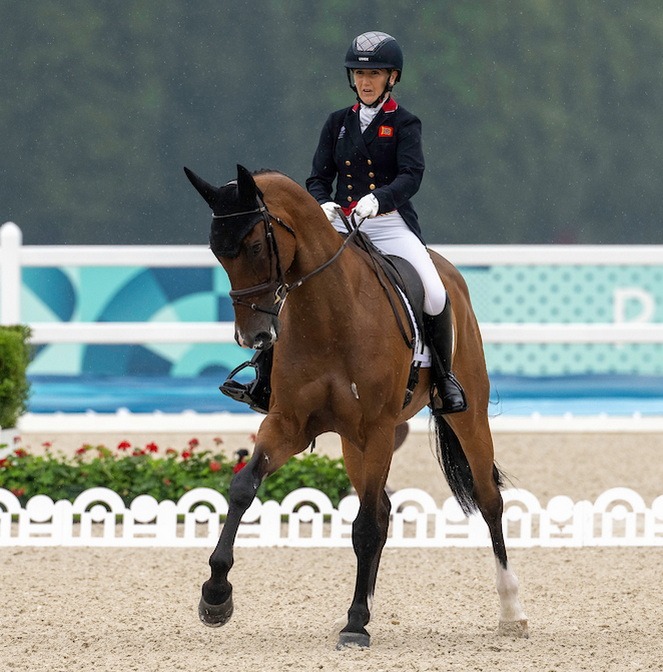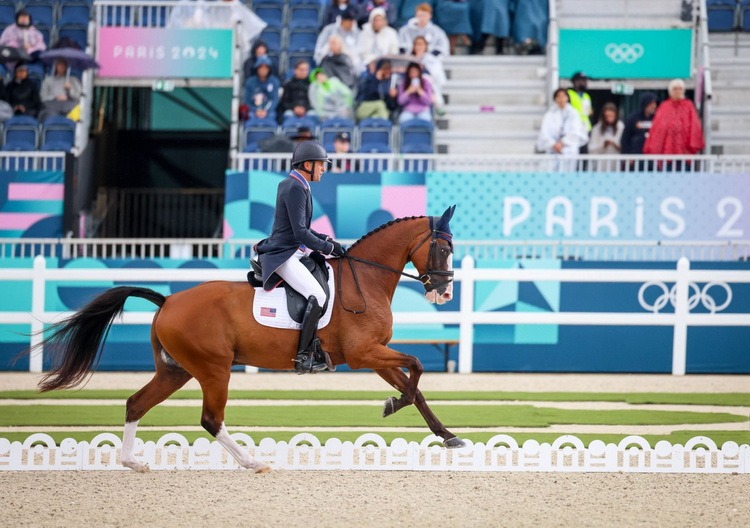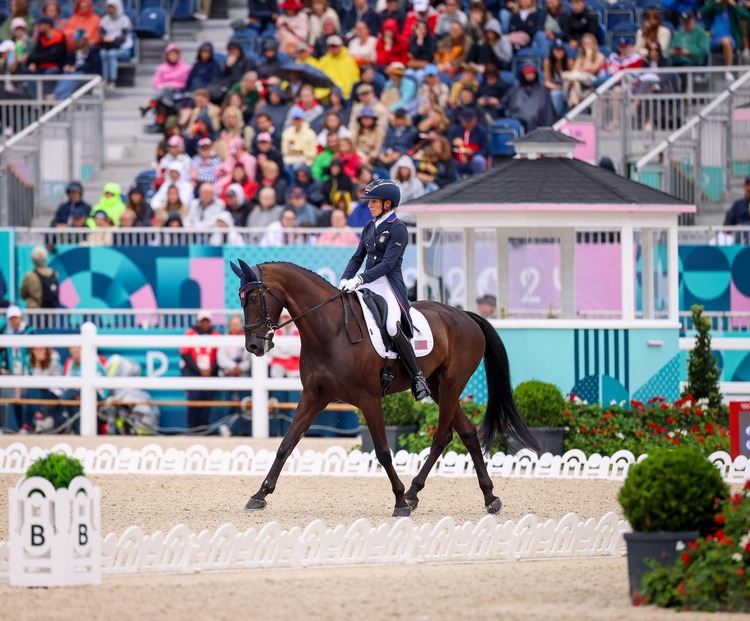The Phantom of the Opera, a funky fashion show, that mechanical horse with a silver-clad rider galloping down the Seine, where boats full of jubilant athletes celebrated the glory of being Olympians. A rare performance by ailing Celine Dion, a tortured torch relay that attempted to include as many French competitors as possible and a one-of-a-kind lighting of the cauldron with the Olympic flame, sending a hot air balloon skyward. And the first time the bells of Notre Dame rang out since a devastating 2019 fire. Wow!
With the memory of Friday evening’s crazy and colorful opening ceremonies lingering, the Paris Olympics got down to business Saturday morning as eventing dressage began, showcasing a quick, intense 3-minute, 50-second test (it doesn’t even include the customary initial halt) that had never been performed in competition prior to these Games.
There were 64 competitors crammed into one day of dressage, so three-day eventing really goes on three days, and not four, as is usual elsewhere in high-end events. The International Olympic Committee has strict guidelines to which eventing must adhere, so it can be included in future Olympics. There’s always a danger of all horse sports being dropped, which means one day of eventing dressage it is! (Someone on social media suggested the mechanical horse is the only horse that should be included in an Olympics, so you can see the perception problem.)
Britain went right to the forefront, with an amazing 17.5-penalty ride by Laura Collett and London 52. That’s an Olympic record for international test number 390 on Laura’s resume. Is it necessary to say that her horse didn’t put a foot wrong? Her marks for individual movements soared into the 80s, with 85 percent for her entry and 82 for shoulder-in. (Percentage points are converted to penalties for the standings.)
“That’s pretty cool,” Laura said when informed of her record. (The previous record is 19.3 penalties, set in 2000 at Sydney by Olympic individual gold medalist David O’Connor of the USA and adjusted so that test score jibes with current parameters.)
“That horse is one in a million,” Laura emphasized, saying he can handle the presence of a crowd, but hoped she hadn’t misspoke when she saw the size of the crowd at Versailles. She hadn’t. He was cool, calm and listening to her.
“He’s an absolute show-off and he loved being in front of a palace with crowd of people cheering him on, so I’m just so lucky to sit on a horse like that,”
She added, “That horse is unbelievable – what he’s done throughout my whole career is just amazing and he just keeps on delivering. I’m just very, very grateful to him. It’s safe to say that I’ve never enjoyed a dressage test more in my life.”
Combined with a score of 25.8 from early leader Tom McEwan on JL Dublin, and 23.4 from Ros Canter (favored to win the individual title) on Lordships Graffalo, Britain was well in the lead for team standings and in fact set a record for the lowest score after dressage at the Olympics (66.70). The previous record of 68.6 was set in Hong Kong in 2008 by Australia, according to our friends at EquiRatings, who are doing a great job of keeping everyone updated on analytics.
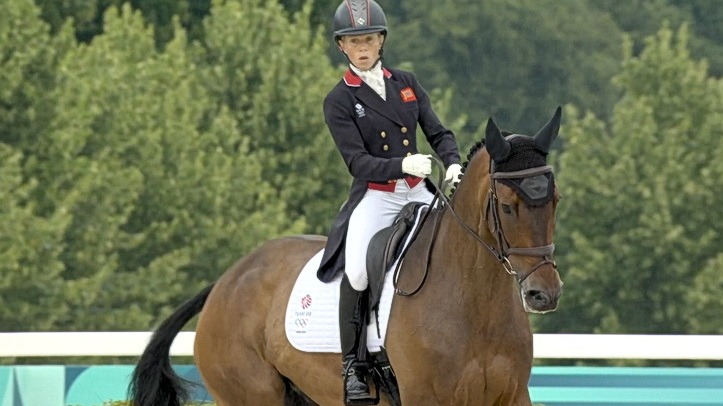
Ros Canter and Lordships Graffalo.
Germany’s star, Michael Jung, just missed out on setting a world record of his own. His score with Chipmunk FRH was 17.8 penalties, a mere 0.3 back of Laura.
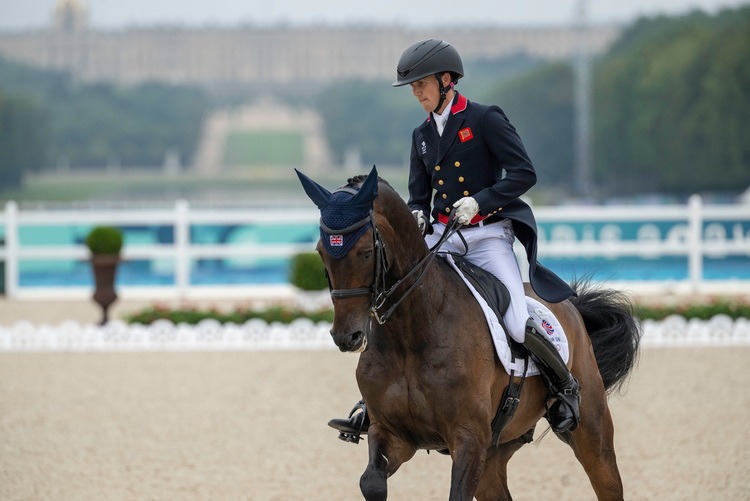
Tom McEwen said he had “a little bit more electricity” under him than usual with JL Dublin, as the horse took in the impressive Versailles vista. (photo Jon Stroud Media)
Germany’s Julia Krajewski on the 10-year-old Nickel 21, rode first in the competition and was very composed, considering her horse’s age and lack of experience. Nickel’s previous exposure to the big time stardom came at Aachen earlier this month, where he and Julia won.
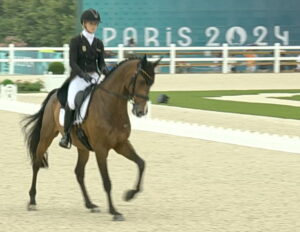
Julia Krajewski and Nickel 21.
The only woman ever to earn Olympic eventing individual gold (2021) was a late call-up to the team, replacing Sandra Auffarth and Viamant du Matz who was deemed not fit. Her mark of 26.9 penalties offered flowing but controlled flying changes and was good enough for fifteenth place.
Despite a flurry of anticipation that broke up the walk segment, Julia’s teammate, Christoph Wahler on Carjatan S, pulled into twenty-first place with 29.4 penalties. Germany stands second overall on 74.10 penalties. France edged into the top three with 80.7 penalties and the support of the flag-waving home crowd.
Where is the U.S. in all this? Sixth (88.9 penalties) behind New Zealand (83) and Japan (87.4).
Things didn’t go as hoped for the Americans, who lost a top prospect when both of Will Coleman’s horses were not fit to compete. That being said, the rider who replaced him, former traveling alternate Liz Halliday, was the highest-ranked for the U.S., in nineteenth place on Nutcracker with 28 penalties in her first Olympics.
Anchor rider Boyd Martin thought his mount, Federman B, was set for a special performance, but noted the left to right flying changes became “a bit of a muddle” leading up the event.
He called his ride “an awesome test, except for two moments which were disastrous.”
The number six-ranked rider in the world added with a resigned tone, ” l sort of felt like I gave my all. It would have been awesome to have four great changes, but it wasn’t to be today.”
Boyd is twenty-sixth on 30.5 penalties and looking forward to Sunday’s cross-country, saying “I’ve got complete belief in Bruno,” as his horse is known.
His plan calls for him to go “fast but calm at the beginning. There’s nothing I see out there he can’t do, but I see a lot of jumps he could have a mistake at.”
“It’s a hell of a course out there, but I think my horse is tailor-made for this track. I’ve got to stay switched on for every jump, every stride. I feel like the American horses are in a great place and this is our opportunity to have a crack at this.”
The first U.S. rider to go, Caroline Pamukcu, made a nice impression in her Olympic debut, where she has said her focus is entirely on the team, not individual glory. The Pan American Games individual gold medalist kept the lid on HSH Blake when he spooked during the half-pass, and one flying change was a bit of a scramble. But a score of 30.4 for twenty-fifth place was admirable, considering the imposing atmosphere in the arena at Versailles.
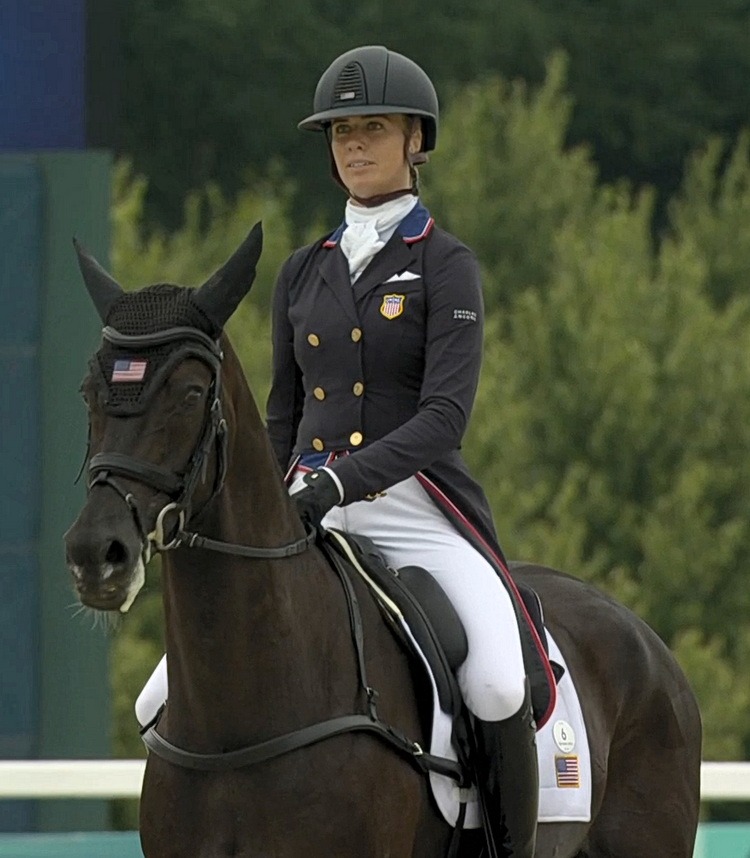
Caroline Pamukcu and HSH Blake.
She repeated that old saying, it’s not a dressage competition, and knows the cross-country test is demanding. There are, she said, no “gimme” fences on the route designed by Pierre Le Goupil.
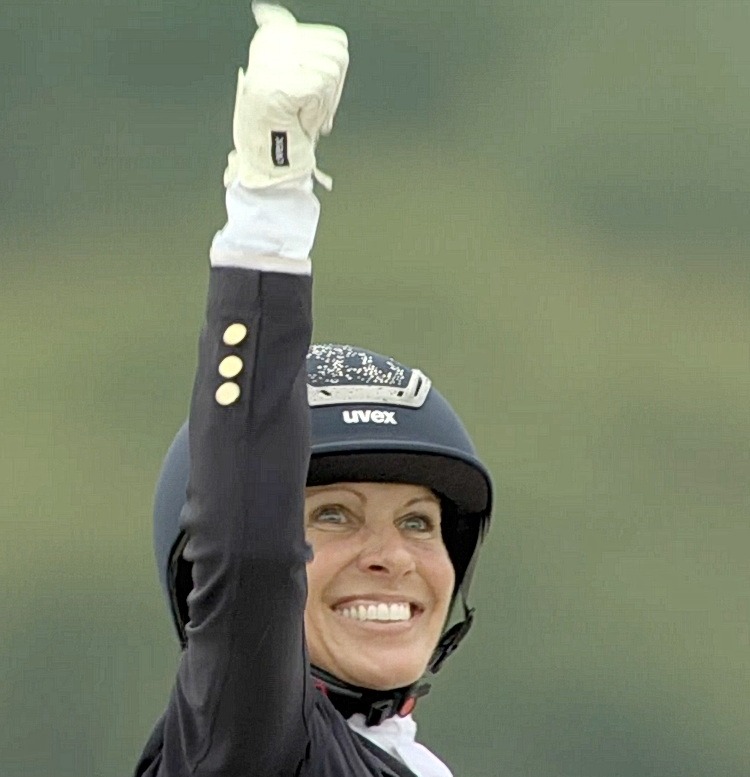
Liz Halliday triumphant after her test on Nutcracker.
Liz produced a very determined test with Nutcracker from the get-go, receiving a mark of 80 percent (that’s Isabell Werth territory) for her entrance into the arena. Finding out at the last minute that she would be riding in the Games after all left Liz with a feeling of sadness for Will Coleman and his disappointment. Then her mood went from “shock, to oh my gosh, to okay, `now I’m just going to be a competitor again.’ ”
Getting to ride in the Games was emotional for her; she sheepishly admitted she cried on Olympic TV.
We should mention Australia’s Shane Rose, who many thought would not make it to the Olympics after enduring fractures to his elbow, femur, pelvis and ribs following an accident during training in March. But they didn’t know Shane. He is very much in Paris and was riding well despite what he’d been through, standing thirty-eighth aboard 19-year-old Virgil.
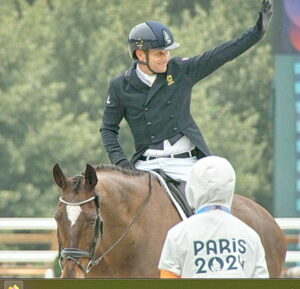
Shane Rose and Virgil.
Click here for individual results. Click this link for team results.
There is much more to come. Keep returning to this website, where we will tell you what happened on cross-country, where the action begins Sunday at 4:30 a.m. Eastern time.

